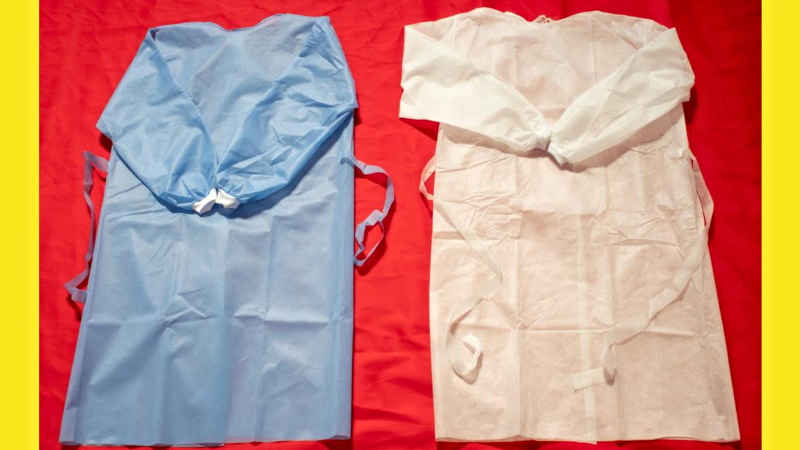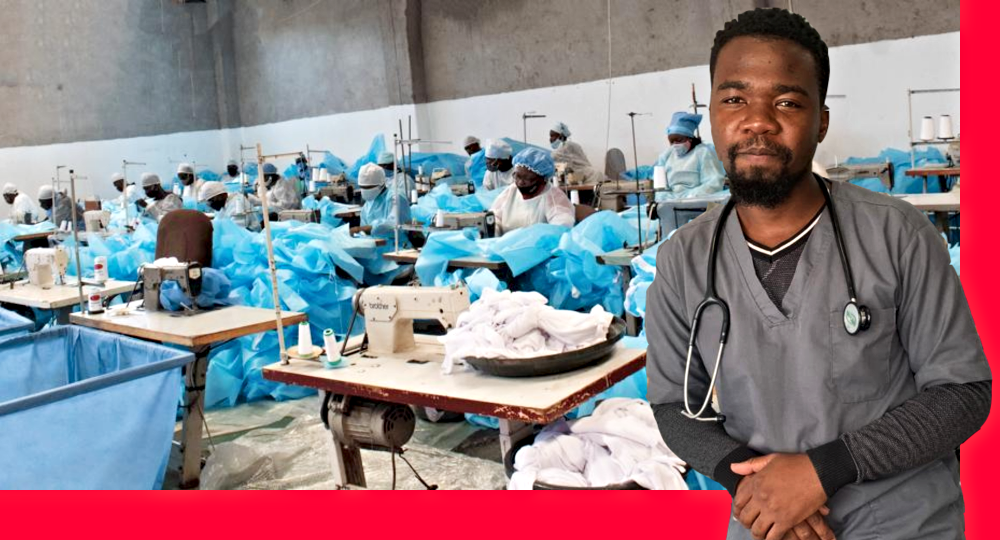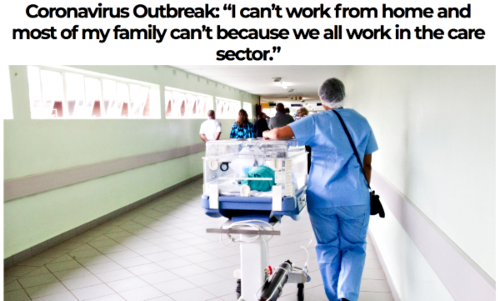Whilst pharmaceutical shortages are rampant in Zimbabwe’s public hospitals, newly graduated Dr Blessing Kambarami – at just 26 years of age – does not fold his hands and resign when his profession is defined by difficult working conditions.
Kambarami has set up his own COVID-gowns manufacturing factory Martha & Son Pharmaceutical Industries and employs 50 workers to get a handle on things.
Job conditions for Zimbabwe´s public hospital doctors and nurses are not rosy.
In desperate circumstances, nurses’ pictures go viral on social media as they are shown wearing patients’ gowns as COVID PPE (personal protection equipment).
Some hungry medics reportedly dipping into patients food rations.
In one humiliating footage patients bed linen was filmed being washed in an open-air township river streams in 2019.
Salaries for public hospital doctors in Zimbabwe hover around $115, according to the Zimbabwe Hospital Doctors Association union.
Humiliated, thousands of Zimbabwe doctors have repeatedly walked away from their posts via job strikes or emigration.
So, when the COVID pandemic outbreak took hold in March 2020, Kambarami quickly rounded dozens of tailors to manufacture disposable isolations gowns donned by frontline workers.

Results have been illustrious. From 200 gowns a day he has tripled his output to 5000 gowns and delivered 40,000 so far.
“I own a company named Martha & Son Pharmaceutical Industries which is currently manufacturing disposable isolation gowns (DIG) used by the frontline healthcare workers in the fight against COVID,” he says.
In Zimbabwe, not many doctors are publicly known as entrepreneurial factory owners.
While toiling in medical school from 2013 to 2018, Kambarami viewed at close range the uncomfortable dominance of “globalization”.
That means foreign fabrics from China thus flooding Zimbabwe’s hospitals, and ravaging local textile jobs.
“I set up Martha & Son Pharmaceutical Industries to manufacture low cost, locally sourced products of competitive quality to counter imports and boost domestic production of medical goods,” he says.
“We plan to replace imports someday. We believe the day is near when all pharmaceutical needs of Africa shall be produced in Africa,” he says.
A tiny loan of $600 from his mother kicked into gear his plans. “She didn’t end there,” he says.
“My mother vowed to mentor me using her experience. In her honour, I chose to name the company Martha, and intentionally hid my name Son. Today she works at the factory as a product manager.”
For now, his factory specializes in medical textiles and these include disposable gowns, jackets, coveralls, PPE kits, body bags, etc.

Zimbabwe health ministry is desperate for any kind of medical supplies, often accepting donations of planeloads from as far as China.
This is an opportunity for local entrepreneurs to centre production at home.
“In near future, our factory will start producing other types of medical consumables including Urine bags, IV lines, syringes, and medical shoe covers and scrub caps,” he states.
Getting a few dollars to spare – is the elephant in the room for Zimbabwe’s youth entrepreneurship dreamers.
Youth aged 18-34 are thought to account for 60% of Zimbabwe’s unemployment rate.
So, how did Kambarami fare where his peers stumble?
“In broad picture, I started the company with a total capital of $1000. I had $500 which I had stashed aside to buy a car. My mother topped me up with $600, along with her abandoned industrial sewing machines,” he says.
This feels too “lucky”, he admits because his first samples of the garments earned brisk orders in the market. “We were flooded with demand and clients vowed to pay in advance,” he reveals.
This first-time jolt of confidence from buyers boosted his profits and every cent of profit was slotted back into the production line.
“In just four months we increased our sewing machines from 3 to 40, rented a spacious warehouse and have enough in the till to pay our workers,” he says.
Covid-19 the uninvited accelerator
For a while, he has toyed around with ideas of manufacturing medical gowns in Zimbabwe. Then the pandemic accelerated and forced him to act. “There was suddenly a visible, big need,” he says.
Demand for medical products has become so whopping across Zimbabwe that even his factory is unable to stymie demand. So, in July alone he ramped up production from 200 gowns a day to 400.
COVID buoyed profits, yes, but the pandemic almost curtailed the factory´s operations too.
“Lockdowns,” he sighs. “At first we ran into serious difficulties to source raw materials, supplies closed to protect workers. The situation has bettered.”
Finding a large layout of finance still makes Kambarami scratch his head.
“We are still an underfunded company. At most instances, we find ourselves illiquid. We remain afloat though and are growing.”
To get an upper hand over severe hydroelectricity shortages that trouble all of Zimbabwe industries and a fluctuating currency which sheds value almost weekly, in relation to the US dollar, Kambarami sells their covid products priced in both the local Zimbabwe dollar and the reliable US dollar currency.
Zimbabwe despite its huge unemployment dilemma is still a good place to obtain a knowledgeable workforce like tailors or garment pressers.
“Zimbabwe has a talented workforce,” Kambarami says. “A lot of unemployed youths have been coming forth to look for jobs at our factory. It’s not difficult to find workers.”
Workers are not difficult but it must be hard to balance one’s life as a busy hospital doctor and another as a hands-on factory owner.
“I do not know how I manage my two jobs,” he says. Kambarami. “Being a doctor is demanding. Running a factory is equally hectic. My mother and our workforce are my rock of support.”
Young medical workers in Zimbabwe don’t normally venture into setting up their factories, let alone a pharmaceutical one. Kambarami’s story is an outlier.
But he says nothing is daunting to youths out to imitate his ventures.
“Do not fear to do it,” he advises and puts it bluntly, “starting a company from scratch is not easy; work through hurdles and remember – youth is when you have peak energy. Don’t waste it.”
Written By: Ray Mwareya – a freelance journalist whose work is published in The Guardian, China Radio International, Financial Times, and many more.
Images Copyright – I Am New Generation Magazine / Shutterstock
More Stories
Manufacturing in the UK vs China: The trials of getting a new product to market as a young startup












